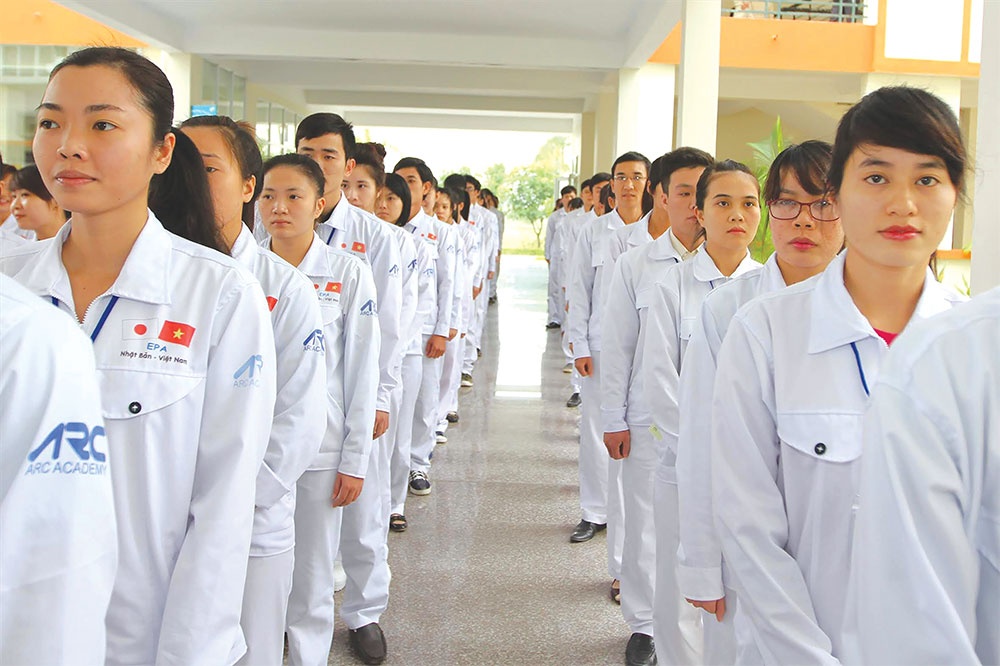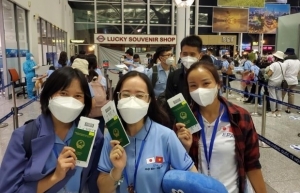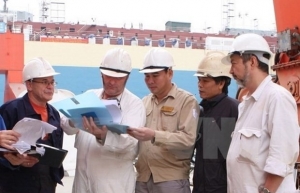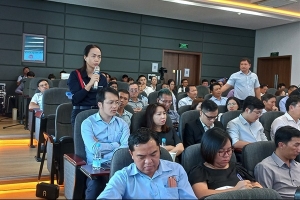Rights made central to foreign worker policy
Supporting foreign workers to reduce pressure, especially related to the cost of working abroad, is one of the important goals in the sustainable development strategy of Teijin Frontier Corporation (TFR), a multi-industry trading and export corporation headquartered in Osaka. TFR currently has 22 branches worldwide with nearly 900 employees, most of which are foreign workers.
 |
| Associations want to make it easier for Vietnamese to work in Japan, Photo: Le Toan |
Masato Okamoto, head of Environmental Safety and Quality Assurance of TFR, said that about 40 per cent of Chinese and Vietnamese trainees who come to work for the company arrive in debt.
“Trainees have to pay an application fee and deposit to the sending organisations in their home country,” he said. “Many people tell us that all their salary in the first year of coming to Japan is used to pay off debt, and they don’t save a dime.”
According to Okamoto, trainees are not allowed to change jobs during the internship period, so it is also difficult for them to speak up about working conditions.
“I think it is necessary to take measures to support foreign technical intern trainees to solve these problems to help them reduce the pressure to work better, thereby also contributing to reducing legal violations,” he said.
TFR is not the only Japanese company that proposes to reduce the economic burden on export workers and trainees from Vietnam. Many businesses and organisations operating in Japanese human resource supply are also discussing this issue with Vietnamese management units.
The reason trainees from Vietnam are accounting for an increasing proportion of workers in Japan is they are mainly from poor rural areas and are willing to pay exceptionally high fees to work abroad.
According to Ingrid Christensen, director of the International Labour Organization (ILO), Vietnamese workers have to pay at least $8,000 to access their first job in Japan.
“This contradicts international standards on migration which indicates that no recruitment fees or related costs should be charged to, or otherwise borne by, workers or jobseekers,” she said.
She said ILO research often revealed that payment of recruitment fees by workers increased their risk of ending up in forced labour. The payment of high recruitment fees contributes to the increased vulnerability of workers as they have to repay their debts for several months, or even years. And resigning prematurely from a job was not an option as the debt remains.
Japan is a very attractive destination for Vietnamese workers and also benefits the country. It tackles a labour shortage and contributes significantly to Japan’s economy, according to the Japan International Friendship Association (JIFA).
Data from the Ministry of Labour, Invalids and Social Affairs of Vietnam shows that, out of 15 countries that send interns to Japan, Vietnam is the leading country. By 2022, the number of Vietnamese trainees entering Japan had reached about 68,000. Vietnamese account for the largest proportion of foreign workers working in Japan, at 25 per cent of the total. As of June last year, the number of Vietnamese living in Japan had reached 480,000.
“Vietnamese workers are highly appreciated for their diligence, hard work, and enthusiasm. This is an important and indispensable community in the current socioeconomic development of Japan,” said Ishii Chikahisa, first secretary at the Embassy of Japan in Vietnam.
“However, human resource exchange between the two countries still has problems. The fact that many Vietnamese workers have to pay a large fee before coming to Japan is one example.”
JIFA president Ikeda Setsuko added, “Employees have to borrow a lot of money to pay brokerage fees and services to middlemen, and these loans often carry very high interest.”
The cost that Vietnamese workers have to pay to intermediaries before coming to Japan is among the highest anywhere. In China it is $4,400, Indonesia $1,700, and the Philippines $710, according to Setsuko.
Among reasons people from Vietnam may not perform well are poor foreign language training, inadequate orientation, and collecting service fees higher than the prescribed level.
According to Shishido Kenichi, special assistant to the president of the Japan International Cooperation Agency (JICA), the financial burdens lead to a high number of Vietnamese workers fleeing. In 2022, Vietnam had over 5,570 technical trainees go missing.
“Last December, Japanese agencies began to discuss a new mechanism to let foreign workers go to Japan at no cost, work with peace of mind, and develop sustainably,” said Shishido.
JICA has also proposed creating an international standard recruitment policy, so employees do not have to pay costs. Private Japanese companies will pay the service costs, and service businesses will not let brokers interfere in the recruitment process and comply with the law.
According to the ILO, Vietnamese workers in Japan send home about $3 billion per year, and both Japan and Vietnam are making efforts to protect rights, moving towards eliminating recruitment fees and related costs for migrant workers.
 | Japan, RoK, Taiwan welcome back Vietnamese guest workers Japan, the Republic of Korea, and Taiwan (China) have announced their plans to resume the reception of Vietnamese labourers from November as many foreign labour markets have reopened after the COVID-19 pandemic is basically controlled. |
 | 93,000 foreigners currently have work permits in Vietnam There are currently more than 93,000 foreigners with work permits in Vietnam, according to data from the Ministry of Labour, Invalids and Social Affairs. |
 | KoCham raises foreign workers residence issue at VBF The ongoing issue of residence rights of foreign workers in industrial zones (IZs) has been raised at the Vietnam Business Forum (VBF), highlighting the concerns of the Korean business community. |
What the stars mean:
★ Poor ★ ★ Promising ★★★ Good ★★★★ Very good ★★★★★ Exceptional
Latest News
More News
- PM outlines new tasks for healthcare sector (February 25, 2026 | 16:00)
- Ho Chi Minh City launches plan for innovation and digital transformation (February 25, 2026 | 09:00)
- Vietnam sets ambitious dairy growth targets (February 24, 2026 | 18:00)
- Masan Consumer names new deputy CEO to drive foods and beverages growth (February 23, 2026 | 20:52)
- Myriad risks ahead, but ones Vietnam can confront (February 20, 2026 | 15:02)
- Vietnam making the leap into AI and semiconductors (February 20, 2026 | 09:37)
- Funding must be activated for semiconductor success (February 20, 2026 | 09:20)
- Resilience as new benchmark for smarter infrastructure (February 19, 2026 | 20:35)
- A golden time to shine within ASEAN (February 19, 2026 | 20:22)
- Vietnam’s pivotal year for advancing sustainability (February 19, 2026 | 08:44)

 Tag:
Tag:














 Mobile Version
Mobile Version